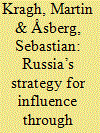|
|
|
Sort Order |
|
|
|
Items / Page
|
|
|
|
|
|
|
| Srl | Item |
| 1 |
ID:
184773


|
|
|
|
|
| Summary/Abstract |
Based on an analysis of around 500 texts from security-affiliated Russian academic journals and one newspaper over a ten-year period, this article details how conspiratorial ideas are spread, tolerated and legitimised within military institutions and official think tanks in Russia. Particular conspiracy theories systematically underpin a broader conspiratorial worldview, which in its basic orientation is anti-Western and illiberal, and which reinforces a perception of Russia as being under threat. As such, this phenomenon serves to justify and rationalise both Russian foreign policy conduct, as well as the targeted repression of various domestic groups as necessary for security reasons. We discuss whether the prevalence of conspiratorial ideas merely reflects an established worldview popular in certain circles or if it influences actual policy and outline some policy implications for the interpretation of Russian foreign policy conduct. The prevalence of conspiracy theories in renowned publications is a concern in itself since it hampers a genuine understanding of international affairs.
|
|
|
|
|
|
|
|
|
|
|
|
|
|
|
|
| 2 |
ID:
154814


|
|
|
|
|
| Summary/Abstract |
Russia, as many contemporary states, takes public diplomacy seriously. Since the inception of its English language TV network Russia Today in 2005 (now ‘RT’), the Russian government has broadened its operations to include Sputnik news websites in several languages and social media activities. Moscow, however, has also been accused of engaging in covert influence activities – behaviour historically referred to as ‘active measures’ in the Soviet KGB lexicon on political warfare. In this paper, we provide empirical evidence on how Russia since 2014 has moved towards a preference for active measures towards Sweden, a small country in a geopolitically important European region. We analyse the blurring of boundaries between public diplomacy and active measures; document phenomena such as forgeries, disinformation, military threats and agents of influence and define Russian foreign policy strategy. In summary, we conclude that the overarching goal of Russian policy towards Sweden and the wider Baltic Sea is to preserve the geostrategic status quo, which is identified with a security order minimising NATO presence in the region.
|
|
|
|
|
|
|
|
|
|
|
|
|
|
|
|
| 3 |
ID:
108072


|
|
|
|
|
| Publication |
2011.
|
| Summary/Abstract |
Through a study of Soviet legal practices, the article examines the enforcement of coercive laws and their limitations in the Soviet command economy. New archival documentation shows the scale and scope of Stalin's coercive machinery. Firstly, we show why labour legislation assumed its specific form, based on an economic analysis of the command economy. Secondly, we identify four specific limits to the efficient enforcement of the legislation: collusion, search costs, administrative congestion and in absentia convictions. Thirdly, we provide new input to the discussion on the scale of the Gulag apparatus, showing that certain data need to be treated cautiously.
|
|
|
|
|
|
|
|
|
|
|
|
|
|
|
|
|
|
|
|
|